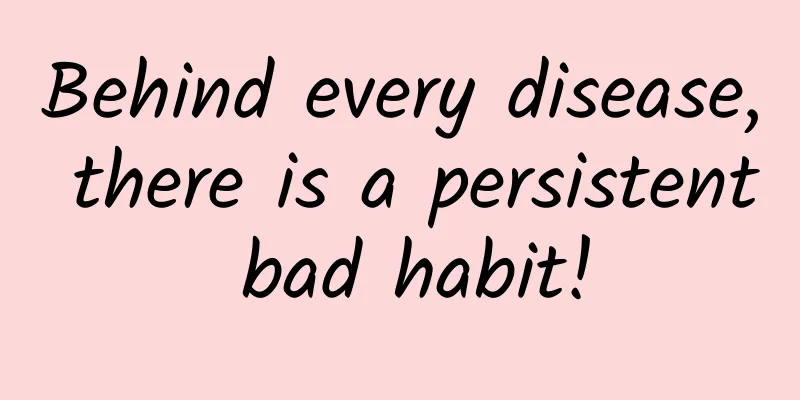Behind every disease, there is a persistent bad habit!

|
Reviewer of this article: Chen Haixu, Deputy Director and Master Supervisor of the Second Medical Center of PLA General Hospital "Doctor, how did I get this disease? I'm usually in good health and have never been hospitalized." Many people always ask the doctor this question unconsciously when they go to the hospital for treatment. In fact, there is no such thing as a sudden disease. Many diseases are caused by one or more persistent habits. 1. Peptic ulcer - irregular meals If you don't eat on time, stomach acid will not be neutralized by food in time, and the high acid state can easily lead to peptic ulcers. Yu Kang, chief physician of the Department of Nutrition at Peking Union Medical College Hospital, said that the stomach is most afraid of being late and irregular. If you usually eat dinner at about 6-7 pm, but for various reasons you change it to 8 or 9 o'clock on a few days, and then eat at 5 o'clock in two days, and then 9 or 10 o'clock in a few days, this will cause confusion in the stomach's punctuality. At this time, a lot of gastric juice has been secreted, but there is no food in the stomach, causing the gastric juice to directly erode the gastric mucosa, which can easily cause gastric ulcers over time. Recommendations: It is best to eat breakfast between 7 and 8 in the morning, because people have the strongest appetite at this time; it is best to have a 4-5 hour interval between breakfast and lunch; dinner is best between 6 and 8 in the evening, and avoid eating after 9 in the evening. If you really can't eat on time, you should still eat something easily digestible a little later. Copyright image, no permission to reprint 2. Irregular heartbeat – staying up late and sleeping late Zhang Jian, director of the Heart Center at Beijing Chest Hospital, published an article sharing a case in which a girl occasionally felt her heart twitching, and a 24-hour electrocardiogram caught several attacks. After asking about the situation, it was found that she had been staying up late for nearly six months, working from 3 pm to 5 or 6 am the next day. The work pressure was also relatively high. Although she had time to catch up on sleep during the day, she could not recover. Zhang Jian said that the girl was given drugs to regulate her heart rate, but for her, the most important thing is to adjust her biological clock. This kind of working rhythm day and night is like jet lag. We can adjust, but the heart cannot adjust, and finally it becomes chaotic and damaged. Suggestion: Some arrhythmias are not diseases, and are not related to organic heart disease. Rather, they are caused by inappropriate lifestyle behaviors. As long as you maintain a regular work and rest schedule, combine work and rest, and quit smoking and drinking coffee, your condition will improve. 3. Dry eyes syndrome - always looking at the phone, overusing the eyes The harm caused by excessive reliance on mobile phones cannot be ignored. Yu Xiaobing, deputy director of the Department of Ophthalmology at Beijing Hospital, said that it is undoubtedly easy to cause eye fatigue and induce eye diseases. Mobile phone screens are relatively small, and the distance between mobile phones and eyes is relatively close. If used for too long, it is easy to cause eye fatigue. In addition, because the number of blinks is reduced, tears evaporate in large quantities, which can easily lead to dry eyes. It should be noted that in addition to bad eye habits, impaired meibomian gland function, abnormal hormone secretion, reduced blinking, medication use, connective tissue disease, vitamin A deficiency, environmental factors, etc. are all causes of dry eye syndrome. Suggestions: Generally, you need to look into the distance after looking at your phone for 30 minutes; you can choose to eat more yellow vegetables on a daily basis; do not play with your phone in places where the light is too strong or too dark; remind yourself to blink more often to moisturize your eyeballs; when your eyes are tired, you can massage your orbital bones to help the secretion of tear glands; or use a warm towel to apply heat to your eyes for about 5 minutes. Copyright image, no permission to reprint 4. High blood pressure - eating too much salty and heavy food The "Ten Core Information on Salt Reduction for Chinese Residents" issued by the National Health Commission mentioned that about 50% of hypertension and 33% of stroke are caused by a high-salt diet. A high-salt (sodium) diet can lead to a variety of diseases such as hypertension, stroke, gastric cancer, and osteoporosis. Yang Yuexin, president of the Chinese Nutrition Society, pointed out that reducing salt intake is the simplest way to lower blood pressure. Recommendation: Adults should not consume more than 5 grams of salt per day. In addition to the salt used for cooking at home, we should pay special attention to the hidden salt in processed foods. The sodium content in snacks such as noodles, potato chips, French fries, and soy products should not be underestimated, so we should eat less of them. We should eat more fresh fruits and vegetables rich in potassium. 5. Hemorrhoids – Sitting for a long time Wang Youli, deputy chief physician of gastrointestinal surgery at Peking University People's Hospital, said: "In the past two years, many young white-collar workers have come to my clinic for hemorrhoids. Sitting in one position for a long time will slow down the blood return in the anus, obstruct blood circulation, and easily expand the venous plexus in the rectum, causing blood congestion and forming hemorrhoids." People who sit for long periods of time, stay up late, and have an uncontrolled diet are at high risk of hemorrhoids. Recommendation: Stand up and move around every half an hour. Exercise is one of the best ways to prevent hemorrhoids. Do not hold back your bowel movements. Clean your anus promptly after bowel movements to prevent contamination from residual feces. Avoid spicy foods, tobacco, alcohol and other irritating foods. 6. Lung cancer – smoking Zhi Xiuyi, chief expert of thoracic surgery at Xuanwu Hospital of Capital Medical University, said that smoking is the primary factor leading to the high incidence of lung cancer. Lung problems or other chronic diseases caused by smoking will only appear 20 or 30 years after heavy smoking. The American Society of Clinical Oncology Annual Meeting emphasized that smoking is closely related to small cell lung cancer and squamous cell carcinoma, and more than 95% of small cell lung cancer is related to smoking. More than 80% of patients who died of lung cancer were caused by smoking. Of course, air pollution, mental factors, kitchen fumes, etc. also have a certain impact. Recommendation: Quit smoking and avoid secondhand smoke. Copyright image, no permission to reprint 7. Liver cancer – moldy food In the prevention recommendations of the "Recommendations for Screening and Prevention of Common Malignant Tumors in Residents" issued by the Shanghai Anti-Cancer Association, liver cancer mentioned preventing the intake of moldy food. Zhao Jianjun, chief physician of the Department of Hepatobiliary Surgery at the Cancer Hospital of the Chinese Academy of Medical Sciences, said that hepatitis is the number one cause of liver cancer in my country, while the second largest cause, aflatoxin, is easily overlooked. Recommendation: Throw away peanuts if they have a rancid smell, because once they are contaminated with aflatoxin, it is very difficult to remove; it is also recommended to eat rice as soon as you buy it, and do not store it at home in large quantities for a long time, as it will easily become moldy once it gets damp; place the washed chopsticks with the small end facing up and the large end facing down to let them dry to avoid moisture and mold. 8. Periodontal disease – not brushing your teeth properly If you don't brush your teeth properly or even don't brush your teeth at all, pathogenic plaque will be attached to your mouth within 24 hours. Li Zheng, deputy chief physician of the Department of Stomatology at Peking University Third Hospital, said that dental plaque is constantly generated in the mouth and grows very quickly. It can grow into a mature plaque form within 24 hours. In other words, if you don't brush your teeth for a day and a night, the plaque attached to the tooth surface will already be pathogenic. The two most common oral diseases - caries and periodontal disease - are both related to dental plaque. Recommendation: It is best to brush your teeth once in the morning and once in the evening. The correct way to brush your teeth is to brush vertically along the gaps between teeth, or to use a small vibration brush. Use the Bass brushing method, brush all parts of your teeth, and brush for 3 minutes. If you keep brushing your teeth, you may still have dental plaque. It is best to go to a regular hospital for an oral examination once a year to remove dental plaque. 9. Esophageal cancer: Eat hot food while it is hot my country is a country with a high incidence of esophageal cancer, mainly in the Taihang Mountain area at the junction of Henan, Hebei and Shanxi, as well as northern Sichuan, northern Jiangsu and northern Fujian. Professor Yu Zhentao, director of the Department of Thoracic Surgery at the Shenzhen Hospital of the Cancer Hospital of the Chinese Academy of Medical Sciences, said that the high incidence of esophageal cancer is closely related to the eating habits of these areas. People in many areas like to drink hot tea and eat raw porridge. The normal tolerance temperature of the esophageal mucosa is 40℃-50℃. If it exceeds this range, it is easy to be damaged, causing mechanical damage such as breakage and ulceration. Although the mucosal epithelium has the function of proliferation and repair, and will recover on its own after damage, long-term repeated stimulation will lead to chronic damage to the mucosa, which may induce cancer. In addition, barbecue, smoked foods, fried foods, etc. contain a lot of nitrite. Habits such as eating too fast, smoking and drinking are also related to the occurrence of esophageal cancer. Recommendations: Do not often eat hot, spicy, raw, cold and other irritating foods; do not smoke and drink less; eat a light diet and eat less pickled food; chewing slowly is important for protecting the esophagus. 10. Lumbar muscle strain - Crossing your legs for a long time Sun Haolin, deputy chief physician of the Department of Orthopedics at Peking University First Hospital, said that crossing one's legs can cause the pelvis to tilt, the lumbar spine to bear uneven pressure, causing lumbar muscle strain, and also uneven force on the lumbar disc. This posture for a long time is a risk factor for lumbar disc herniation. Especially for adolescents in their growth and development period, crossing their legs frequently can easily cause hunchbacks and spinal curvature. Recommendation: Try not to cross your legs at ordinary times, and keep your pelvis upright when sitting so that the lumbar spine is evenly stressed. Source: Health Times This article has been authorized. Please contact the original author for reprinting. The watermarked images and cover images in this article are from the copyright gallery, and the image content is not authorized for reprinting |
<<: After being hit 5 times in half a year, can the Webb telescope still work normally?
>>: How can I tell the authenticity of the wine I bought for my dad?
Recommend
“Stay up late and drink the most nourishing water”, does ginseng water really have miraculous effects?
Before I officially start, I would like to ask yo...
The "fighter" among vegetarians! How to eat a flexible vegetarian diet?
Vegetarianism is a diet pursued by many people, a...
iOS 15.1 official version will be released soon. There are not many new features, but it is recommended to upgrade
The biggest difference between smartphones and pr...
Monkeypox is once again a global threat. Is it a sexually transmitted disease?
Monkeypox is the second virus, after Ebola, to co...
In-depth review: The conversion rate is only 9%, I summarized 6 pitfalls
As one of the proven effective means of attractin...
iOS 16.2 finally supports 120Hz high refresh rate!
The day before yesterday, Apple pushed the iOS 1...
100 marketing campaigns, 20 campaign experiences!
Every year, I participate in the planning and imp...
All things grow with the help of the sun. Is it possible to grow without it?
For reprinting, business cooperation, please scan...
Tmall Marketing Methodology White Paper
The booming development of the Internet economy h...
Don’t know where your users are losing? 80% of people do conversion analysis this way
For our products and operations , conversion anal...
A brief analysis of the three principles and four strategies for community content operations
A good community will inevitably form a stable cl...
WeChat Moments Advertising- Charging Strategy
Moments ads support two purchasing methods: sched...
Xiaomi Mi Band is hot-selling: Four ways to gain a foothold in the wearable market
Recently, IDC released a report on the wearable d...
Huanwang Technology: Cross-border, smart large-screen investment enters the third stage
Since 2020, the smart large-screen industry has a...
The forms and methods of Zhihu promotion
Zhihu’s advertising formats are diverse, includin...









